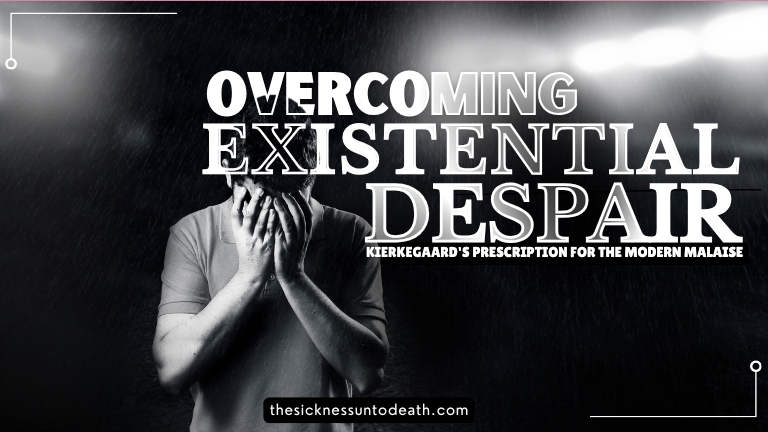In an era where existential questions often spiral into despair due to the pressures and chaos of modern life, the 19th-century philosopher Søren Kierkegaard’s insights can offer refreshing clarity. Kierkegaard, widely regarded as the father of existentialism, delved deep into the concept of despair, examining its roots and proposing ways to transcend it. His approach, though centuries old, resonates profoundly with the challenges of contemporary society.
Understanding Existential Despair
For Kierkegaard, existential despair is not just a fleeting sense of sadness; it is a profound state of being that arises when there is a misalignment between one’s actual self and one’s potential self. It’s the feeling of being stuck, of living without purpose or direction. In today’s terms, it’s what many experience when they feel disconnected from their work, their relationships, or their community—when life feels meaningless.
Kierkegaard’s Prescription for Modern Malaise
- Self-Reflection and Awareness: Kierkegaard believed that the journey out of despair begins with self-reflection. He encouraged a deep and honest look into one’s inner self to understand the source of despair. This process involves asking oneself tough questions about personal values, beliefs, and contradictions. In a practical sense, this could involve practices like journaling, meditative introspection, or therapy.
- Establishing a Relationship with the Infinite: A core element of Kierkegaard’s philosophy is the importance of establishing a relationship with the infinite—whatever that may signify for an individual, whether it’s God, the universe, or a set of ethical principles. This relationship provides a larger context for one’s existence and helps anchor the self in a set of values or beliefs that transcend the immediate pressures of daily life.
- Authentic Living: Kierkegaard stressed living authentically as a remedy to despair. This means making choices that are true to one’s self, rather than conforming to societal expectations or external pressures. It involves embracing one’s freedom to choose and accepting the responsibility that comes with it. For the modern individual, this could mean pursuing a career or a hobby that aligns with one’s passions, advocating for beliefs that resonate with one’s core, or simply choosing to live in a way that feels genuinely fulfilling.
- Community Engagement: While Kierkegaard often highlighted the individual’s journey, he also acknowledged the role of community in providing a buffer against despair. Engaging with others in meaningful ways can reinforce one’s sense of purpose and belonging. This might involve participating in community service, joining clubs or groups that align with one’s interests, or fostering deep, supportive relationships.
- Accepting Imperfection: Part of overcoming despair involves accepting the imperfection of the human condition. Kierkegaard suggested that recognising and accepting one’s limitations and imperfections can actually be a source of freedom and relief, as it alleviates the pressure to be perfect and allows one to pursue a more authentic and fulfilling life.
Conclusion
Kierkegaard’s philosophical remedies for existential despair are strikingly relevant in today’s world, where many struggle with feelings of disconnection and meaninglessness. By fostering greater self-awareness, connecting with something greater than oneself, living authentically, engaging with community, and accepting human imperfections, individuals can find not only relief from despair but also a deeper sense of fulfilment and joy in life.
This approach does not promise an easy fix but offers a profound and enduring way to navigate the complexities of modern existence, transforming despair into a catalyst for growth and deeper understanding.

